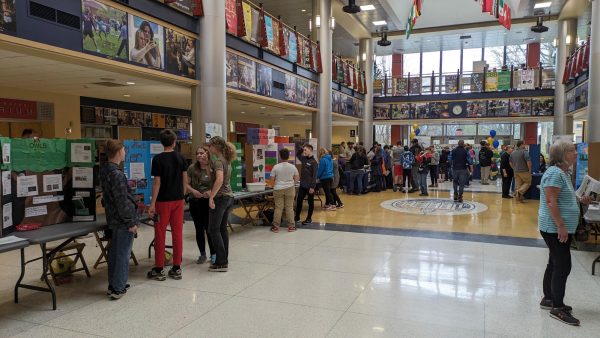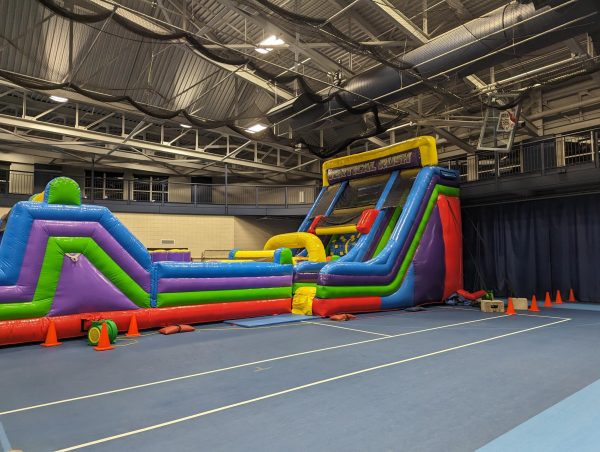Religion and social change series discuss divisions within society and the church
Sojourners Christian Fellowship held the third of a three-part Religion and Social Change Series during their weekly meeting in the Henderson Campus Center on Wednesday, Feb. 22. The sessions were discussion-based and were led by Chaplain Jane Ellen Nickell, with each session looking at a particular social and religious issue. The series came out of Nickell’s doctoral research that looked at religion and social change in the Methodist church and how religious communities adapt when the world around them changes.
“One of the big takeaway messages was to take things in the context that they were written,” said Theresa Buczek, ’17, member of Sojourners Christian Fellowship.
The first session on Wednesday, Feb. 8 looked at race and racism within the Christian tradition in the United States.
“It’s been said that 11 o’clock [on Sunday] is the most segregated hour in the country. It’s true and there are a lot of reasons for that,” Nickell said. “We tend to say we should all be together, but that erases the importance of the black church and the black communities throughout our history.”
Nickell’s research focused on how one group of people gains dominance over another and how people are then socialized to repeat those patterns.
“I come to these topics as a white, heterosexual women. My research was try to figure out ‘What has the dominant culture done?’” Nickell said.
The group began each session by looking at scripture passages and then looking at the social context and how that may affect how scripture is read and interpreted today.
“Scripture doesn’t say anything about race because race wasn’t a concept, but what does it say about difference — about different nationalities or ethnicities — and then how do we look at those?” Nickell said.
Why is same-sex marriage a threat to heterosexual mariage? Because it changes that institution.
— Jane Ellen Nickell
The second session on Wednesday, Feb. 15 looked at women, particularly female leadership within the Church.
“We talked again about women in the Bible, women in the Christian movement and … patterns as Protestant churches began to ordain women,” said Nickell. “[There is] this assumption that men should be in leadership that a lot of people just sort of embrace. [This] poses the question ‘Why is that?’ and ‘How do we deal with that?’”
The final session looked at sexuality and Lesbian, Gay, Bisexual, Transgender and Questioning rights and problems within the church.
Buczek said the group looked at passages of scripture that are often emphasized to form religious arguments against homosexuals or members of the LGBTQ+ community and analyzed them to find possible alternative interpretations.
“The rules are changing, and interpretation is kind of a big thing now to take into consideration,” said Buczek.
Nickell said she believes the religious arguments that are often made — such as ‘The Bible says it is wrong’ — mask deeper divisions within society.
“Why is same-sex marriage a threat to heterosexual marriage? Because it changes that institution,” Nickell said. “It’s a fundamental change to the way we view legal unions, which to people in heterosexual marriage somehow makes them feel like theirs is being threatened. It’s not a direct threat to them, it’s not that they can’t stay married, but it’s changing a norm that has identified who we are as people and that’s scary.”
Throughout all three sessions the group discussed the divisions within the church and how these social issues have placed pressure on the church throughout history and at times caused areas of the church to split.
One of the focuses for the series was to get people to ask themselves how these issues affect them and how they are affecting these issues, according to Nickell.
“What do I do? What are the ways that I’ve been shaped by a racist and sexist culture? How do I perpetuate that? How do we become aware of this dynamics and try to work to dismantle them?” Nickell said.
Buczek said she believes these discussions can be eye-opening and that they prevent people from living and seeing the world only from their own bubble.
“I think it’s dangerous to not be willing to at least listen to other people’s perspectives or the different ways that they might interpret certain things, especially with the Bible and today and how different people will say certain things,” Buczek said.
Sojourners Christian Fellowship meets weekly, and Darby Rupp, ’17, group leader, said these kinds of discussions are not unusual for the group.
“We have a lot of conversations. Everyone is welcome whether you’re religious or not. It’s very much a place for exploring questions of faith and questions of how faith relates to the world,” Rupp said.
Nickell said that these kinds of discussions are important in helping Allegheny College become a diverse community.
“We obviously are still dealing with issues of difference — different identities and perspectives — and … as a college I think we’re still coming to terms and figuring out how to be a diverse community,” Nickell said. “We have the diversity now, but we don’t always know how to deal with it.”






